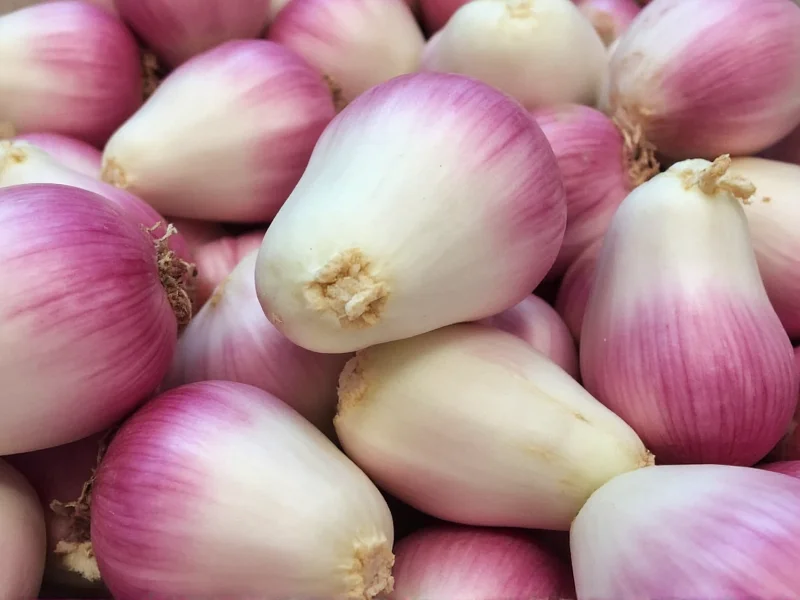Freezing shallots is an excellent way to extend their shelf life while maintaining culinary quality. Unlike some vegetables that lose texture when frozen, shallots respond well to proper freezing techniques, retaining their distinctive mild onion flavor that's essential in many recipes. Whether you've harvested your own garden shallots or bought a bulk package on sale, freezing provides a practical solution to prevent waste.
Why Freeze Shallots?
Shallots offer a delicate flavor profile that enhances sauces, dressings, and gourmet dishes, but their relatively short refrigerator life (2-4 weeks) often leads to spoilage. Freezing solves this problem by:
- Preserving flavor compounds that degrade at room temperature
- Maintaining texture better than refrigeration for long-term storage
- Eliminating the need for frequent grocery trips for this specialty ingredient
- Preventing sprouting and mold development common in stored shallots
Step-by-Step Freezing Methods
The best approach depends on how you typically use shallots in your cooking. Each method has specific advantages for different culinary applications.
| Freezing Method | Preparation Steps | Best For | Storage Duration |
|---|---|---|---|
| Chopped Frozen | Peel, chop, spread on tray, flash freeze, then transfer to airtight container | Recipes requiring minced shallots | 10-12 months |
| Sliced Frozen | Peel, slice uniformly, flash freeze, then bag with air removed | Sauteing, roasting, caramelizing | 8-10 months |
| Whole Frozen | Peel entire shallot, freeze directly in airtight container | Recipes needing whole shallots | 6-8 months |
| Shallot Oil | Saute chopped shallots in oil, cool, freeze in ice cube trays | Instant flavor base for dishes | 4-6 months |
Proper Freezing Technique Details
For optimal results when you freeze shallots for long term storage, follow these professional kitchen-tested steps:
Preparation Essentials
Begin with fresh, firm shallots free from blemishes or soft spots. The curing process matters—properly cured shallots (dried for 2-3 weeks after harvest) freeze better than freshly pulled ones. Peel carefully to minimize waste, as the thin skin can be challenging to remove.
Blanching Considerations
Unlike many vegetables, shallots don't require blanching before freezing. Their natural enzyme structure remains stable without this step, and blanching can actually diminish their delicate flavor. Simply chopping and flash-freezing preserves more of their distinctive taste compared to other preservation methods.
Air Removal is Critical
When storing frozen shallots, eliminate as much air as possible from containers. Oxygen causes freezer burn and flavor degradation. Use vacuum sealing for best results, or press plastic wrap directly against the shallots before sealing containers. Glass jars work well but leave ½ inch headspace for expansion.
Storage Duration and Quality Factors
Understanding how long do frozen shallots last depends on several factors:
- Temperature stability: Maintain consistent freezer temperature at 0°F (-18°C) or lower
- Packaging quality: Vacuum-sealed containers outperform regular freezer bags
- Cutting size: Finely chopped shallots degrade faster than larger pieces
- Freezer type: Chest freezers maintain more stable temperatures than upright models
Most frozen shallots retain excellent quality for 6-12 months. After this period, they remain safe to eat but may develop slight texture changes or diminished flavor intensity. For best results in delicate sauces and raw applications, use within 6 months.
Using Frozen Shallots in Cooking
One of the most frequently asked questions is does freezing shallots affect flavor. When properly frozen, shallots maintain 90% of their original flavor profile. The main texture difference appears in raw applications—frozen-thawed shallots become softer and work best in cooked dishes.
Thawing Recommendations
You rarely need to fully thaw frozen shallots before use. For most cooking applications:
- Add frozen chopped shallots directly to hot pans—they'll thaw in 1-2 minutes
- For dressings or raw applications, thaw overnight in the refrigerator
- Never microwave shallots for thawing as this creates uneven texture
Chef's tip: Frozen shallots release moisture faster than fresh when sautéing. Cook over medium heat (not high) to allow proper evaporation before browning occurs.
Freezing Shallots vs Other Preservation Methods
When deciding freezing shallots vs onions or other preservation techniques, consider these factors:
- Refrigeration: Lasts only 2-4 weeks and often leads to sprouting
- Drying/Dehydrating: Concentrates flavor but changes texture completely
- Pickling: Alters flavor profile with vinegar and spices
- Freezing: Best method for maintaining original flavor with minimal texture change
Unlike onions, shallots have higher sugar content which makes them particularly well-suited for freezing. Their smaller size also means they freeze more uniformly than larger onion varieties.
Common Freezing Mistakes to Avoid
Learn from these frequent errors when you freeze whole shallots or prepared pieces:
- Skipping the flash-freezing step (causes clumping)
- Using containers with too much headspace (increases freezer burn risk)
- Freezing unpeeled shallots (moisture trapped in skin causes ice crystals)
- Storing near strong-smelling foods (shallots absorb odors easily)
- Freezing in large quantities (slows freezing process, damaging cell structure)
Properly frozen shallots should maintain individual separation when stored correctly. If your frozen shallots form a solid block, you've likely used improper packaging or skipped the crucial flash-freezing step on a baking sheet.
Special Considerations for Gourmet Cooking
Professional chefs often wonder can you freeze shallots for gourmet recipes without quality loss. The answer is yes—with proper technique. For delicate sauces like béarnaise or vinaigrettes, use frozen shallots within 3 months for optimal flavor. The freezing process slightly breaks down cell walls, causing frozen shallots to release their flavor compounds more quickly than fresh.
When making shallot confit, freezing works exceptionally well. Prepare the confit as usual, cool completely, then freeze in portion-sized containers. This method preserves both flavor and texture better than refrigeration for long-term storage.











 浙公网安备
33010002000092号
浙公网安备
33010002000092号 浙B2-20120091-4
浙B2-20120091-4